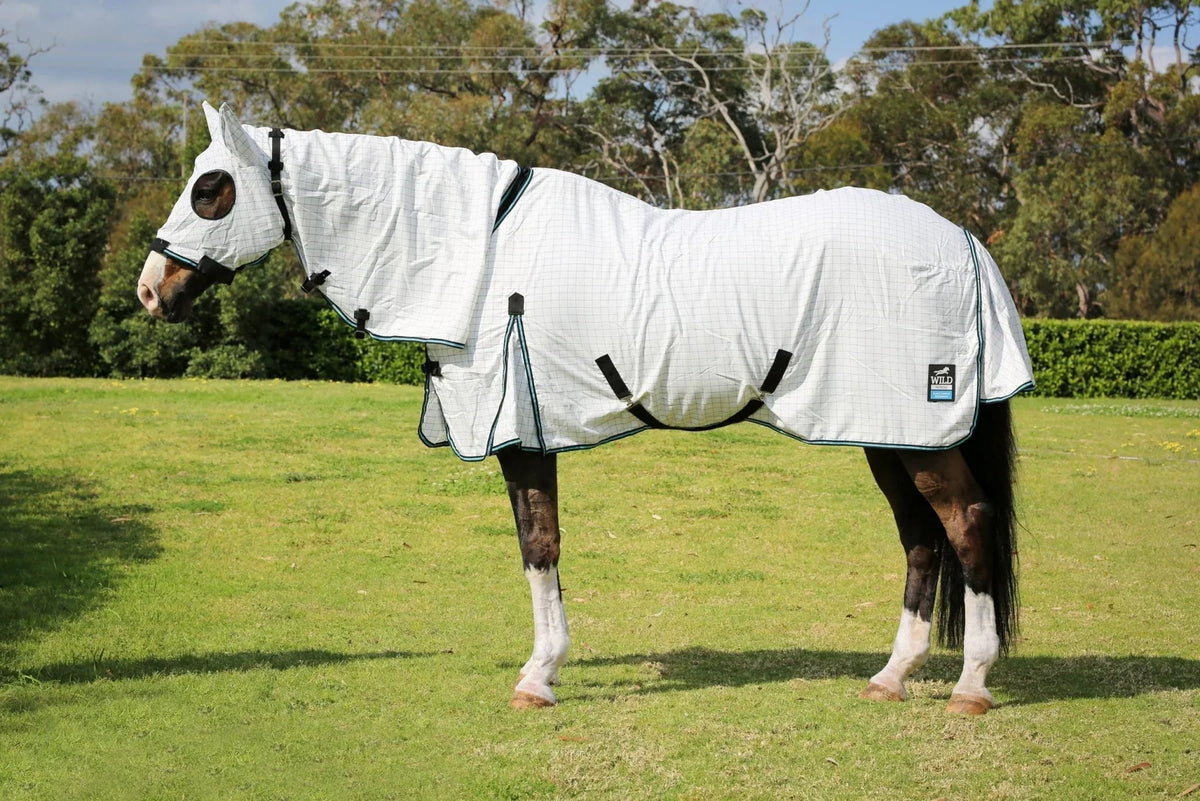
Ultimate Guide to Managing Summer Itch in Horses: Prevention and Treatment
|
|
Time to read min
Written by: Lauren Daly
|
|
Time to read min
Horses often experience heightened susceptibility to itching during the summer months, primarily due to insect bites and allergic responses. One prevalent condition is "Queensland Itch," also recognized as "Sweet Itch," triggered by an allergic reaction to the saliva of biting midges. To assist your horse in managing these itchy summers, here are some recommendations for both preventing and addressing Queensland Itch.
Utilize Summer Rugs: Opt for lightweight, breathable rugs to shield your horse from insect bites, maintaining cleanliness and preventing coat bleaching. Consider materials like Ripstop Poly-cotton, Polyester Mesh, or Flag material for their breathability and quick drying properties.
Grand National Light II: Crafted from soft poly-cotton ripstop, suitable for year-round use, offering summer comfort.
Brisa: Versatile poly-cotton ripstop fabric suitable for both summer and winter.
Airflow: Blend of Ripstop poly-cotton and mesh for enhanced airflow, ideal for hot days.
Cool Air: Mesh construction for maximum ventilation, perfect for hot, humid conditions.
Flag: Lightweight and thin, ideal for overheating horses but less durable for rugged use.
Protect Rugs: Available in light flag material or cool mesh, great for itchy horses.
The WildHorse range of fly repellent rugs employs a patented technology process to effectively fuse Permethrin into the fabric, addressing itching at its source. The Hood version ensures complete coverage of the horse's face and ears, guarding against bites.
Our go-to solution for horses battling bad cases of the itch? Wild Horse Rugs!
We've found these rugs to be a game-changer for our itchy horses - once you try them, you'll never look back! Not only do they boast an excellent fit, but the fabric is also lightweight and breathable, ensuring comfort on even the hottest of days.
Apply equine-friendly insect repellents to deter biting insects. These specially formulated repellents, containing active ingredients like permethrin or natural botanical extracts, create a protective barrier against flies, mosquitoes, ticks, and biting midges. Regular application on exposed areas helps minimise insect bites, allergic reactions, and discomfort.
Use medicated shampoos or lotions specifically designed for horses to soothe and heal the skin. Wash your horse with a gentle, soothing shampoo to alleviate itching, remove irritants, and maintain overall skin health and apply topical treatments to improve symptoms:
Calafea Oil: Apply directly to the mane and tail for relief.
Just Magick Range: Includes shampoo, oil, and lotion for comprehensive care.
EquaCare CuraPet Remedeaz Range: The EquaCare CuraPet Remedeaz Range offers a comprehensive solution for horse care, providing shampoo, oil, and treatment options for thorough cleansing and soothing. The shampoo gently cleanses the coat, while the oil provides hydration and conditioning. Specialized treatments address specific skin concerns, promoting healing and overall skin health.
In severe cases, you may need to consult with a vet who can prescribe stronger medications or topical treatments to help relieve the symptoms.
Maintaining cleanliness in the stable and surrounding areas, as well as in paddocks, is crucial for minimizing the presence of insects and creating a healthier environment for horses. By regularly cleaning stables, removing manure, and disposing of any stagnant water or organic debris, you can significantly reduce breeding grounds for mosquitoes and flies. Additionally, implementing proper waste management practices, such as using fly traps and insect-repellent sprays, can further deter insect populations. Regularly mowing grass and removing standing water sources, such as old containers or puddles, helps mitigate mosquito breeding sites. Overall, keeping the environment clean plays a vital role in controlling insect populations and promoting the well-being of horses.
Proper nutrition plays a crucial role in managing itch-related issues in horses. A well-balanced diet supports skin health and bolsters the horse's natural defenses against itching triggers such as allergies or insect bites. Essential nutrients like omega fatty acids, vitamins A and E, and minerals like zinc and copper promote skin integrity and soothe irritation, potentially reducing the urge to itch.
In conclusion, horses are particularly vulnerable to itching during the summer months, often due to insect bites and allergic reactions, with Queensland Itch being a common issue triggered by biting midges' saliva. To aid horses through these itchy seasons, a combination of preventive measures and targeted treatments is essential. Utilizing summer rugs, grooming regularly, and applying equine-friendly insect repellents are effective preventive strategies, while medicated shampoos and lotions provide relief for existing itching.
Maintaining a clean environment and ensuring a well-balanced diet further support skin health and strengthen the horse's natural defenses. Remember, prevention is key, and by implementing these tips, you can significantly reduce the risk of Queensland Itch. However, in severe or persistent cases, seeking advice from a veterinarian is always recommended.
Join our email list for the latest equestrian news, offers & specials (including a 10% discount on your first order - excludes saddles)







